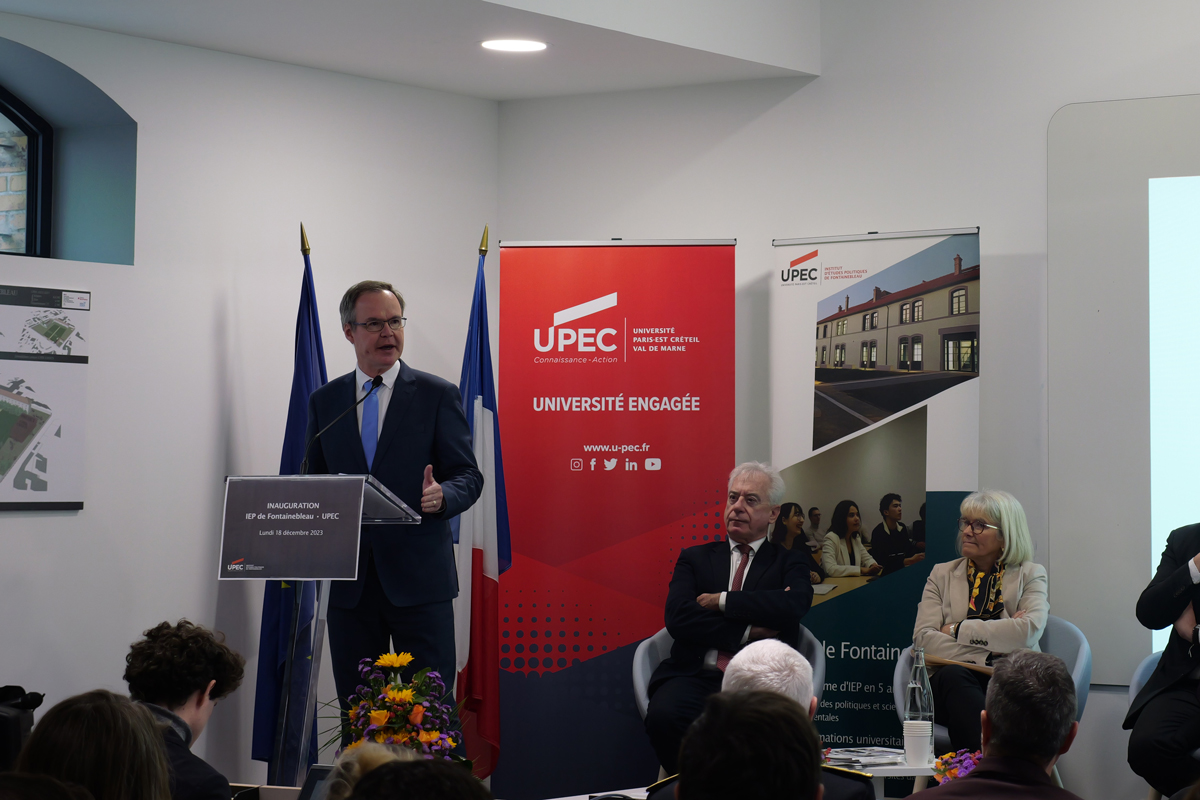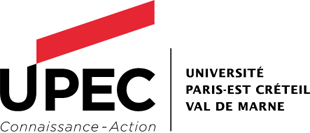- Download PDF
-
Partager cette page
- Download PDF
You are here :
- EN ›
- University
Inauguration of UPEC’s Fontainebleau Institute of Political Science
Published on January 24, 2024
Created on August 1, 2022 through a government order of the French Ministry of Higher Education and Research, UPEC’s Institute of Political Science was inaugurated on December 18, 2023 in the presence of Sylvie Retailleau, Minister of Higher Education and Research, Jean-Luc Dubois-Randé, President of UPEC, and Yves Palau, Director of the Fontainebleau Institute of Political Science.

Since September 2023, the Institute of Political Science, once a political science school, has welcomed some 800 students from the undergraduate to the postgraduate levels. In addition to its own diploma, which gained recognition as a graduate degree in December 2022, the Institute offers three bachelor’s programs (political science, history and political science, and public administration), four master’s programs (public administration, European and international studies, public policies, and political science), and three PhD programs (law, economics, and political science). Programs at the Institute are structured around four main areas, namely interdisciplinarity, research-based education, international outlooks, and professional integration.
This requirement, which is at the heart of the university’s mission, is a key aspect of the Institute’s strategy. Starting in the first year, students at the Institute will learn about scientific methods and controversies. They will also attend conferences organized by professors. The Institute partners with two interdisciplinary graduate programs on areas relating to the environment, law, politics, and digital technology. It is also a member of the Francophonies and Multilingualism: Politics of Language Graduate School.
The Institute of Political Science is housed in two newly renovated 2,000m2 buildings on the Damesme campus, which is at the center of a charming, historic town. A building is to be renovated in 2025 which will be dedicated to student life. A fourth building will be constructed to house nursing programs as part of the ongoing contract with the region. By 2027, the CROUS plans to have built a second student residence and additional food and dining services. The Institute has a dozen student associations which play a role in enhancing the student experience. Many of them participate in an annual student citizen convention, which is an event that currently encompasses the entire UPEC community. For 2023-2024, the convention’s theme is “The University of the Future: A Shared Destiny”. The City of Fontainebleau, the Seine-et-Marne Departmental Council, and the Île-de-France Regional Council have all actively participated in the development of the campus, led by Frédéric Valletoux who expressed the desire to make Fontainebleau a university town.
At the Institute of Political Science, 30% of all students are scholarship recipients. The Institute has implemented an annual program called Talents du Service Public, where a dozen talented scholarship recipients and long-term jobseekers can take classes in preparation for the national category A public sector entrance examination. Since September 2022, the Institute has also offered the Talents de l’Ecole Nationale des Finances Publiques program. During the first year, students will take classes and sit the public finance inspection examination at the Ecole Nationale des Finances Publiques (national public finance school). They will then join the Master’s in Public Finance cohort at the Institute in the second year.
The Institute of Political Science has signed 27 agreements with foreign universities. This year, some 100 students are scheduled to spend a semester abroad or take part in a double bachelor’s or master’s degree with a partner university. Around 40 international students are expected to study at the Institute. Some partnerships give our students two degrees. Two double bachelor’s programs are available in partnership with Leuphana University in Lüneburg and Tor Vergata University of Rome. Double master’s programs are available with the following institutions: Université Catholique de Louvain, Saint Paul University, Babeș-Bolyai University, the University of Catania, and Ecole nationale d’administration publique du Québec.
When Politics Meets Science
The Fontainebleau Institute, ranked 11th in France, sets itself apart by providing political science programs with pathways into the exact and experimental sciences. “It is essential that our students learn these skills so they can become transformation leaders in our society. Medical crises, digital technology, and the environment are scientific issues, but they are also a matter of politics,” said Yves Palau, Director of the Fontainebleau Institute of Political Science.
Research-Based Education: A Shared Requirement for Politics and Science
This requirement, which is at the heart of the university’s mission, is a key aspect of the Institute’s strategy. Starting in the first year, students at the Institute will learn about scientific methods and controversies. They will also attend conferences organized by professors. The Institute partners with two interdisciplinary graduate programs on areas relating to the environment, law, politics, and digital technology. It is also a member of the Francophonies and Multilingualism: Politics of Language Graduate School.
Quality Learning Environment on a Dynamic Campus
The Institute of Political Science is housed in two newly renovated 2,000m2 buildings on the Damesme campus, which is at the center of a charming, historic town. A building is to be renovated in 2025 which will be dedicated to student life. A fourth building will be constructed to house nursing programs as part of the ongoing contract with the region. By 2027, the CROUS plans to have built a second student residence and additional food and dining services. The Institute has a dozen student associations which play a role in enhancing the student experience. Many of them participate in an annual student citizen convention, which is an event that currently encompasses the entire UPEC community. For 2023-2024, the convention’s theme is “The University of the Future: A Shared Destiny”. The City of Fontainebleau, the Seine-et-Marne Departmental Council, and the Île-de-France Regional Council have all actively participated in the development of the campus, led by Frédéric Valletoux who expressed the desire to make Fontainebleau a university town.
A Strong Commitment to Social Development
At the Institute of Political Science, 30% of all students are scholarship recipients. The Institute has implemented an annual program called Talents du Service Public, where a dozen talented scholarship recipients and long-term jobseekers can take classes in preparation for the national category A public sector entrance examination. Since September 2022, the Institute has also offered the Talents de l’Ecole Nationale des Finances Publiques program. During the first year, students will take classes and sit the public finance inspection examination at the Ecole Nationale des Finances Publiques (national public finance school). They will then join the Master’s in Public Finance cohort at the Institute in the second year.
A Diverse Range of International Programs
The Institute of Political Science has signed 27 agreements with foreign universities. This year, some 100 students are scheduled to spend a semester abroad or take part in a double bachelor’s or master’s degree with a partner university. Around 40 international students are expected to study at the Institute. Some partnerships give our students two degrees. Two double bachelor’s programs are available in partnership with Leuphana University in Lüneburg and Tor Vergata University of Rome. Double master’s programs are available with the following institutions: Université Catholique de Louvain, Saint Paul University, Babeș-Bolyai University, the University of Catania, and Ecole nationale d’administration publique du Québec.
Key Figures
- 800 students
- 4 bachelor’s and 3 double bachelor’s degrees
- 7 master’s degrees including 4 international double degrees
- 27 foreign partner universities
- A campus located 40 minutes outside of Paris
- Download PDF
-
Partager cette page
- Download PDF

